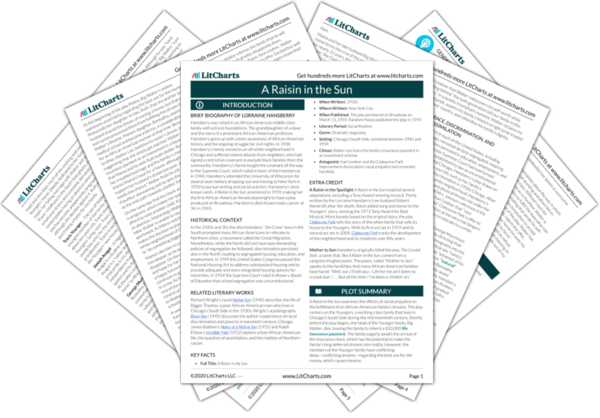The Insurance Payment Quotes in A Raisin in the Sun
Act 1, Scene 1 Quotes
Mama, something is happening between Walter and me. I don’t know what it is – but he needs something – something I can’t give him anymore. He needs this chance, Lena.
Act 2, Scene 1 Quotes
Well – well! – All I can say is – if this is my time in life – MY TIME – to say good-bye – to these goddamned cracking walls! – and these marching roaches! – and this cramped little closet which ain’t now or never was no kitchen! . . . then I say it loud and good, HALLELUJAH! AND GOOD-BYE MISERY . . . I DON’T NEVER WANT TO SEE YOUR UGLY FACE AGAIN!
Act 2, Scene 3 Quotes
Man, I trusted you . . . Man, I put my life in your hands . . . Man . . . THAT MONEY IS MADE OUT OF MY FATHER’S FLESH –
Act 3 Quotes
Independence and then what? What about all the crooks and thieves and just plain idiots who will come into power and steal and plunder the same as before – only now they will be black and do it in the name of the new Independence – WHAT ABOUT THEM?!
Then isn’t there something wrong in a house – in a world! – where all dreams, good or bad, must depend on the death of a man? I never thought to see you like this, Alaiyo.
Talking ‘bout life, Mama. . . . Mama, you know it’s all divided up. Life is. Sure enough. Between the takers and the “tooken.” I’ve figured it out finally. Yeah. Some of us always getting “tooken.”
Son – I come from five generations of people who was slaves and sharecroppers – but ain’t nobody in my family never let nobody pay ‘em no money that was a way of telling us we wasn’t fit to walk the earth. We ain’t never been that poor. We ain’t never been that – dead inside.
Have you cried for that boy today? I don’t mean for yourself and for the family ‘cause we lost the money. I mean for him: what he been through and what it done to him. Child, when do you think is the time to love somebody the most? When they done good and made things easy for everybody? Well then, you ain’t through learning – because that ain’t the time at all. It’s when he’s at his lowest and can’t believe in hisself ‘cause the world done whipped him so!
And we have decided to move into our house because my father – my father – he earned it for us brick by brick. We don’t want to make no trouble for nobody or fight no causes, and we will try to be good neighbors. And that’s all we got to say about that. We don’t want your money.












